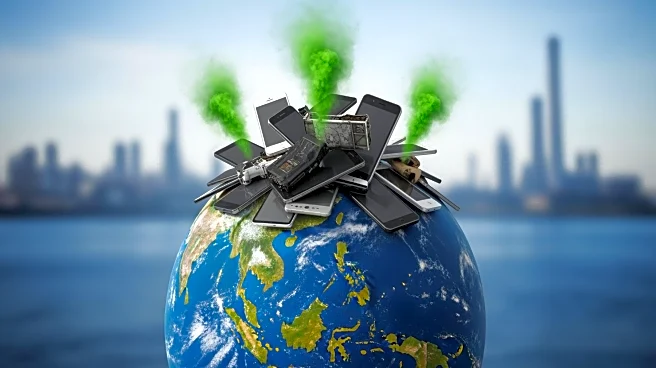What's Happening?
A report by the Basel Action Network reveals that millions of tons of electronic waste from the United States are being exported to Southeast Asia, where countries are ill-equipped to handle the hazardous
materials. The investigation identified at least 10 U.S. companies involved in exporting used electronics, contributing to what is described as a 'hidden tsunami' of e-waste. This waste includes discarded devices containing toxic metals, which are often processed in unsafe conditions, leading to environmental pollution. The report highlights that approximately 33,000 metric tons of e-waste leave U.S. ports monthly, with much of it ending up in landfills or informal scrapyards in Asia.
Why It's Important?
The export of e-waste from the U.S. to Southeast Asia poses significant environmental and health risks, as these regions struggle to manage the influx of hazardous materials. The practice undermines efforts to regulate global waste trade and highlights the issue of 'waste colonialism,' where developed nations offload their waste problems onto less developed countries. This situation exacerbates pollution and strains local waste management systems, potentially leading to long-term ecological damage and health issues for workers exposed to toxic substances. The report questions the effectiveness of industry certifications meant to ensure safe recycling practices.
What's Next?
Countries like Thailand and Malaysia are increasing efforts to curb illegal e-waste imports, with recent seizures of U.S. e-waste at ports. The report calls for stricter enforcement of international treaties like the Basel Convention, which aims to prevent hazardous waste trade. The U.S., not a signatory to the treaty, faces pressure to address its role in global e-waste pollution. Companies involved may need to reassess their practices and compliance with environmental standards, while policymakers might consider more robust regulations to prevent harmful exports.
Beyond the Headlines
The issue of e-waste exportation raises ethical concerns about the responsibility of developed nations in managing their waste. It also highlights the need for global cooperation in addressing environmental challenges and ensuring sustainable practices. The situation may prompt discussions on the role of consumer electronics companies in designing products that are easier to recycle and less harmful to the environment.









